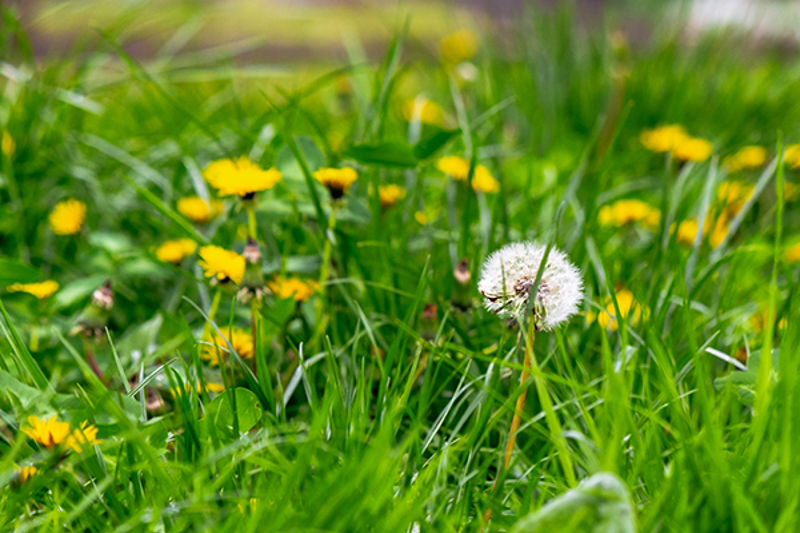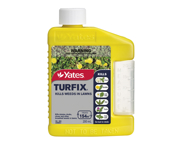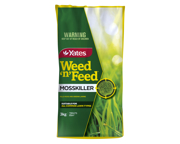Yates Account
Join now
Create a Yates account today!
Sign up to join the Yates Garden Club for monthly e-mails packed with seasonal inspiration, tips for success & exclusive promotions.
Plus if you’re a Garden Club member you can take part in the Yates Growing Community - a blog to share successes, get advice & win prizes in fun challenges along the way!

Forgot password
Enter the email address associated with your account, and we'll email you a new password.

The definition of a weed is a plant that's growing where it's not wanted. For a lawn, that's basically any plant that's not grass!
Lawn weeds typically produce large numbers of seeds, allowing them to spread quickly. They're real survivors, so they're often hardier than lawn grass. If your grass isn't in top condition, weeds can dominate and quickly outcompete it.
| Autumn | Winter | Spring | Summer |
|
Treat lawns to kill broadleaf weeds and clover. Tackle tough weeds like hydrocotyle or oxalis with targeted weedkillers. Feed lawns to maintain good grass cover, to help suppress weeds. |
Spot treat any weeds missed in autumn. Tackle moisture-loving tough weeds like hydrocotyle or buttercup with targeted weedkillers. |
Treat moss and algae, broadleaf weeds and clover. Treat Onehunga weed early, before it forms prickles. Feed lawns to maintain good grass cover, to help suppress weeds. |
Feed lawns to maintain good grass cover, to help suppress weeds. Spray weeds in garden beds with Yates Zero to prevent seeds spreading onto the lawn. |
How to Beat Lawn Weeds
Taking a proactive approach to lawn weeds really pays off, because tackling them while they're small means they don't get a chance to spread seeds. Because weed seeds can remain viable for several years in lawn soil, they're happy to sit there and wait for their chance to plague you next season.
The bad news is that weed seeds are very easily dispersed, so they're impossible to eradicate completely from a lawn. Tiny seeds can be transferred in from elsewhere, on shoes, in manure (from birds and animals), in the breeze, or even by lawn mowers.
The good news is, if you consistently keep on top of weeds in your lawn, after a couple of seasons it seriously reduces the seed lurking in the soil...so it becomes much easier to maintain a clean looking lawn.

There are quite a few good methods to discourage lawn weeds:
- Keeping your grass healthy is key; a healthy dense growth habit will shade out weed seeds, making it much harder for them to germinate.
- Fortunately, cutting your lawns a little higher encourages the sort of dense grass that excludes weeds.
- Well-aerated soil is a much more healthy environment for grass than compacted, heavy soil. Lawn soil that's porous and able to breathe easily encourages healthy dense grass that can shade out weeds, to prevent them getting a foothold.
- Hand weeding takes time, but it's extremely effective. Juvenile weeds are easy to dig out with a hand weeder, and they don't leave behind unsightly divots or bare patches like bigger, more established weeds do.
The best news of all? It doesn't need to be complicated or time consuming to create a weed-free lawn, you can easily wipe them out with a selective herbicide. This type of weedkiller is designed to kill off specific weedy invaders, without harming your lawn grass. Common lawn weeds like dandelion, clover and thistles are easy to get rid of with a selective product. Even the most challenging creeping weeds like hydrocotyle or oxalis can be controlled with selective weedkillers.

What Do All the Different Weedkillers Do?
We introduced you to selective herbicides above; here's a breakdown of the different sub-types of selective weedkillers, and what they're used for.
-
Broadleaf weedkillers - this group includes go-to options that are effective against a broad range of common weeds, but also options that target very specific, troublesome weed species. A versatile example of the first type is Yates Turfix, a popular choice to apply in spring and autumn for weed-free lawns throughout the year. Examples of the more targeted type are Yates Prickle Weedkiller and Yates Hydrocotyle Killer.
-
Yates Weed’n’Feed range - dual-use Weed'n'Feed products selectively remove weeds from the lawn, while also adding nutrients to feed the grass. Great for time-poor lawnies!
-
Moss and algae killers - these herbicides kill moss, algae and lichens in lawns and on hard surfaces like paths, bricks and tiles. These species reproduce by spores rather than seeds, so they need a special approach. Yates Surrender is our own (very effective) moss and algae killer.
While selective weedkillers don't harm cool-season grass species, they can burn warm-season types like kikuyu, couch or ornamental grasses - check the label precautions for advice.
Non-selective herbicides (AKA 'broad spectrum' herbicides) are a completely different kettle of fish, as they kill every plant they contact. Generally, these weedkillers aren't used on lawns because of their grass-killing abilities! However, they are quite useful for clearing entire areas of lawn to make a 'blank canvas' before sowing new grass seed.
Examples are:
-
Glyphosate – it's systemic, so it moves through the plant to the roots. It usually takes about 10 days to take effect.
-
Brush Killers – very effective control for unwanted trees and shrubs (check local Council regulations before using these on established trees). Yates Woody Weedkiller is our favourite.

If you use a sprayer or lawnboy, Yates Turfix Lawn Weed Spray is our go-to choice to cull common lawn weeds. It's compatible with popular NZ lawn types like fescue, ryegrass and browntop.
By far the easiest (and fastest) way to control broadleaf lawn weeds is with Yates Weed'n'Feed Double Action hose-on. Clicking it into the hose and spraying it on takes a few minutes. Yates Weed’n’Feed is also boosted with nitrogen and iron, key lawn nutrients that promote a deep rich green lawn.
If you only have a small patch of weeds, or a small lawn where a hose-on applicator isn't practical, Yates Weed'n'Feed Concentrate is a great choice. It's easy to mix and apply with a watering can or sprayer.
For kikuyu or couch lawns, you can avoid the risk of burning your grass with Yates Weed n Feed Double Action Granular. Apply the granules dry, onto moist grass and weeds, and leave for 2 days before watering in thoroughly. The colour of the lawn will blacken, then quickly recover to its normal state - but even lusher.

Tips for Applying Herbicides
- First, read the label instructions and follow them carefully. Mistakes can happen to the best of us, so don't rush into it!
- When applying to large areas (like lawns) carefully measure the area to be covered. For selective weedkillers, it's important that you apply the correct dose for the specific area. If you work out the size of the area you're treating, you won't over-do it, or under-do it.
- Weedkillers work best when the weed is actively growing (usually during usually spring, summer or autumn). You'll need to be a little more patient for noticeable results during cold winter weather.
















Share
Share this article on social media